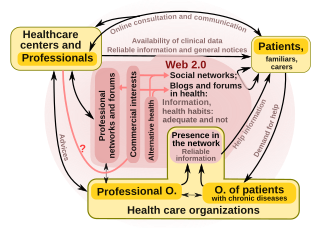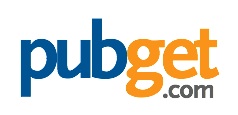MEDLINE is a bibliographic database of life sciences and biomedical information. It includes bibliographic information for articles from academic journals covering medicine, nursing, pharmacy, dentistry, veterinary medicine, and health care. MEDLINE also covers much of the literature in biology and biochemistry, as well as fields such as molecular evolution.

The United States National Library of Medicine (NLM), operated by the United States federal government, is the world's largest medical library.
PubMed is a free search engine accessing primarily the MEDLINE database of references and abstracts on life sciences and biomedical topics. The United States National Library of Medicine (NLM) at the National Institutes of Health maintain the database as part of the Entrez system of information retrieval.

The Entrez Global Query Cross-Database Search System is a federated search engine, or web portal that allows users to search many discrete health sciences databases at the National Center for Biotechnology Information (NCBI) website. The NCBI is a part of the National Library of Medicine (NLM), which is itself a department of the National Institutes of Health (NIH), which in turn is a part of the United States Department of Health and Human Services. The name "Entrez" was chosen to reflect the spirit of welcoming the public to search the content available from the NLM.

EBSCO Information Services, headquartered in Ipswich, Massachusetts, is a division of EBSCO Industries Inc., a private company headquartered in Birmingham, Alabama. EBSCO provides products and services to libraries of very many types around the world. Its products include EBSCONET, a complete e-resource management system, and EBSCOhost, which supplies a fee-based online research service with 375 full-text databases, a collection of 600,000-plus ebooks, subject indexes, point-of-care medical references, and an array of historical digital archives. In 2010, EBSCO introduced its EBSCO Discovery Service (EDS) to institutions, which allows searches of a portfolio of journals and magazines.
SNOMED CT or SNOMED Clinical Terms is a systematically organized computer processable collection of medical terms providing codes, terms, synonyms and definitions used in clinical documentation and reporting. SNOMED CT is considered to be the most comprehensive, multilingual clinical healthcare terminology in the world. The primary purpose of SNOMED CT is to encode the meanings that are used in health information and to support the effective clinical recording of data with the aim of improving patient care. SNOMED CT provides the core general terminology for electronic health records. SNOMED CT comprehensive coverage includes: clinical findings, symptoms, diagnoses, procedures, body structures, organisms and other etiologies, substances, pharmaceuticals, devices and specimens.
eMedicine is an online clinical medical knowledge base founded in 1996 by Scott Plantz MD FAAEM, and Jonathan Adler MD MS FACEP FAAEM, a computer engineer Jeffrey Berezin MS. The fundamental concept was to create a large repository of professional level medical content that could be both updated and accessed continuously to assist in clinical care and physician education. The eMedicine website consists of approximately 6,800 medical topic review articles, each of which is associated with one of 62 clinical subspecialty "textbooks". Pediatrics, for example, has 1,050 articles organized into 14 subspecialty "textbooks" ; the emergency medicine volume has 630 articles and internal medicine has nearly 1,400 articles. If the remainder of the specialty textbooks are added to the total 6800+ articles were created in eMedicine. In addition, the knowledge base includes over 25,000 clinically multimedia files. To create this online content over 11,000 board certified healthcare specialists were recruited and managed in a first generation, proprietary learning management system (LMS). If printed out in hardcopy form, the system's content would total over 1 million pages.
UpToDate, Inc. is a company in the Wolters Kluwer Health division of Wolters Kluwer whose main product is UpToDate, a software system that is a point-of-care medical resource.
MEDCIN, a system of standardized medical terminology, is a proprietary medical vocabulary and was developed by Medicomp Systems, Inc. MEDCIN is a point-of-care terminology, intended for use in Electronic Health Record (EHR) systems, and it includes over 280,000 clinical data elements encompassing symptoms, history, physical examination, tests, diagnoses and therapy. This clinical vocabulary contains over 38 years of research and development as well as the capability to cross map to leading codification systems such as SNOMED CT, CPT, ICD-9-CM/ICD-10-CM, DSM, LOINC, CDT, CVX, and the Clinical Care Classification (CCC) System for nursing and allied health.
The National Centre for Text Mining (NaCTeM) is a publicly funded text mining (TM) centre. It was established to provide support, advice, and information on TM technologies and to disseminate information from the larger TM community, while also providing tailored services and tools in response to the requirements of the United Kingdom academic community.
Embase is a biomedical and pharmacological bibliographic database of published literature designed to support information managers and pharmacovigilance in complying with the regulatory requirements of a licensed drug. Embase, produced by Elsevier, contains over 32 million records from over 8,500 currently published journals from 1947 to the present. Through its international coverage, daily updates, and drug indexing with EMTREE, Embase enables tracking and retrieval of drug information in the published literature. Each record is fully indexed and Articles in Press are available for some records and In Process are available for all records, ahead of full indexing. Embase's international coverage expands across biomedical journals from 95 countries and is available through a number of database vendors.

First Databank (FDB) is a major provider of drug and medical device databases that help inform healthcare professionals to make decisions. FDB partners with information system developers to deliver useful medication- and medical device-related information to clinicians, business associates, and patients. FDB is part of Hearst and the Hearst Health network.
Trip is a free clinical search engine. Its primary function is to help clinicians identify the best available evidence with which to answer clinical questions. Its roots are firmly in the world of evidence-based medicine.

"Health 2.0" is a term introduced in the mid-2000s, as the subset of health care technologies mirroring the wider Web 2.0 movement. It has been defined variously as including social media, user-generated content, and cloud-based and mobile technologies. Some Health 2.0 proponents see these technologies as empowering patients to have greater control over their own health care and diminishing medical paternalism. Critics of the technologies have expressed concerns about possible misinformation and violations of patient privacy.
A selection-based search system is a search engine system in which the user invokes a search query using only the mouse. A selection-based search system allows the user to search the internet for more information about any keyword or phrase contained within a document or webpage in any software application on their desktop computer using the mouse.
Healthline Media, Inc. is an American website and provider of health information headquartered in San Francisco, CA. It was founded in 2006, and established as a standalone entity in January 2016.
In data management, semantic warehousing is a methodology of digitalized text data using similar functions to Data warehousing (DW), such as ETL(Extract, transform, load), ODS(Operational data store), and MODEL. Key value operation is less useful for the digitalized text. Semantic warehousing is different from DW in that semantic information base from text(semantic) data.

Pubget Corp was a wholly owned subsidiary of Copyright Clearance Center that developed cloud-based search and content access tools for scientists. It provided advertising services, enterprise search services, and a public search engine. The company was founded in 2007 by Beth Israel Hospital clinical pathologist, Ramy Arnaout, out of his own need to find papers. Pubget moved its headquarters from Cambridge, Massachusetts to Boston’s Innovation District in 2011.

James M. Heilman is a Canadian emergency physician, Wikipedian, and advocate for the improvement of Wikipedia's health-related content. He encourages other clinicians to contribute to the online encyclopedia.






